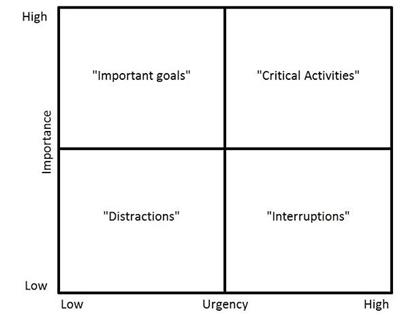Have you ever found yourself postponing something you know is important to work on something else just because it’s due soon?
That’s an example of urgency winning over importance.
The concept is laid out in the Eisenhower Urgent/Important Matrix:

Items that are of low importance and low urgency are distractions. At Far Reach, we work to limit distractions. It’s hard, and we’re not always good at it, but awareness is the first step.
Tasks that aren’t all that important but are very urgent are considered interruptions. Email and IMs are big culprits in this category.
Something that’s both important and urgent is a critical activity. This is the area where a lot of people spend their time because it’s easy. Something urgent comes up, it’s important, so you stop whatever else you’re doing to complete it. Critical activities are dangerous because you can’t necessarily plan for them, but they can pull you away from important but not urgent items.
If something is important but not urgent, it’s considered an important goal. It requires purposeful effort to make these a priority because they’re very easy to postpone. Let’s take strategic planning for your custom software system—determining how to invest in and grow the system. Doing so is extremely important, but it’s not like it has to be done tomorrow. In fact, there’s usually not a hard and fast timeline for important goals. Which means it’s easy to procrastinate.
At Far Reach, we use tenants of scrum to work toward our important goals even though they don’t have due dates. We discuss as a leadership team what we want to accomplish, and we prioritize those items within sprints so we can chip away and continually make progress on them. Doing so keeps us accountable to each other and the greater team and makes it harder for distractions and interruptions to sneak in.
A recent example of an important goal—something important but not urgent—we prioritized is our project portal. Because we’ve determined it will add value for our team and our clients, we’re working on it consistently and balancing it with client project work even though there’s no hard deadline.
What important (but not urgent) items are on your list to do?
Find a Custom Software Development Partner
Learn what to look for in your outsourcing partner.